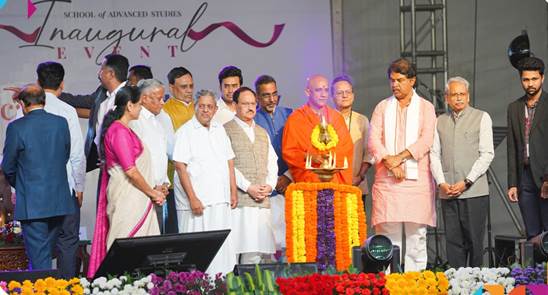Bengaluru: Union Minister of Health and Family Welfare, J P Nadda, inaugurated the new campus of the School of Advanced Studies at Swami Vivekananda Yoga Anusandhana Samsthana (S-VYASA), a Deemed University, in Bengaluru today. The event also marked the launch of DIGI-Vyasa, a digital education platform, and Vyasa TV, a dedicated channel for promoting traditional knowledge systems and holistic wellness.
S-VYASA has been a pioneer in combining traditional Indian knowledge systems with modern education, focusing on Yoga, Naturopathy, and Ayurveda. The new campus is dedicated to Engineering, Computer Applications, and Management, integrating cutting-edge technology with holistic development under the tagline, “Education Meets Industry.” This initiative aims to foster collaboration between academia and industry, providing students with transformative learning experiences.
Addressing the gathering, Nadda emphasized the government’s commitment to holistic healthcare under Prime Minister Narendra Modi’s leadership. “Our visionary Prime Minister has ensured that healthcare in India is comprehensive and integrates AYUSH with modern medicine,” he said.
Highlighting advancements in the AYUSH system, Shri Nadda mentioned that 22 All India Institutes of Medical Sciences (AIIMS) now include AYUSH blocks, fostering a collaborative approach where practitioners of both systems work together for patient care.
Nadda also pointed to India’s growing global footprint in traditional medicine. “The WHO’s Global Traditional Medicine Centre in Jamnagar, Gujarat, is now the world’s hub for traditional medicine studies and innovations,” he said, noting that AYUSH has established collaborations with 103 countries.
The Minister praised the integration of traditional and modern practices at facilities such as the 600-bedded Arogya Dham and the Central Research Institute of Yoga and Naturopathy in Haryana. These initiatives, he said, represent turning points for Yoga and Naturopathy’s inclusion in mainstream healthcare.
Nadda lauded S-VYASA’s contributions to advancing AYUSH. He highlighted the university’s research wing, Anvesana, which has published over 1,000 papers in leading international journals. “S-VYASA exemplifies the synergy between modern science and traditional knowledge,” he said, emphasizing the institution’s role in enhancing the credibility of AYUSH through research and documentation.
He also acknowledged the collaborative efforts of Centres of Excellence in Ayurveda, which work alongside organizations like CSIR, the Department of Science and Technology, and ICMR to strengthen the research framework of AYUSH.
The event witnessed the presence of several notable figures, including Jagadguru Sri Sri Sri Dr. Nirmalanandanatha Maha Swamiji, S-VYASA founder and Vice-Chancellor Dr. H R Nagendra, AICTE Chairman Prof. T G Sitharam, Infosys co-founder Kris Gopalakrishnan, and Members of Parliament and State Ministers, among others.
Nadda concluded by honoring the founders of S-VYASA and reaffirming the institution’s role in shaping the future of education and healthcare. He emphasized that S-VYASA’s new campus, coupled with its digital initiatives, symbolizes a leap forward in integrating modern science with age-old traditional knowledge, setting new benchmarks for holistic development and global wellness.





